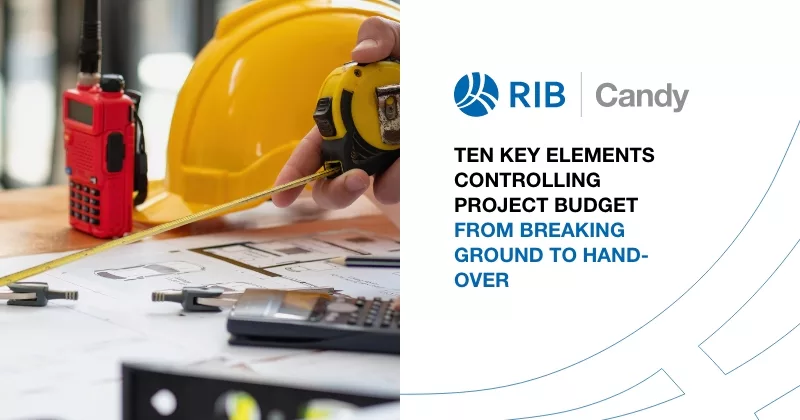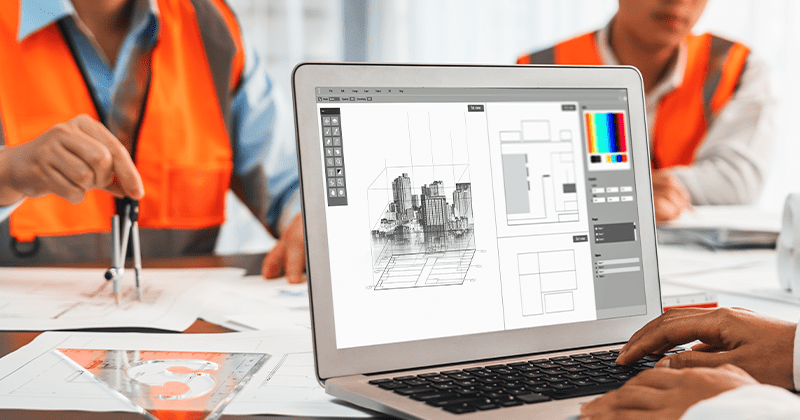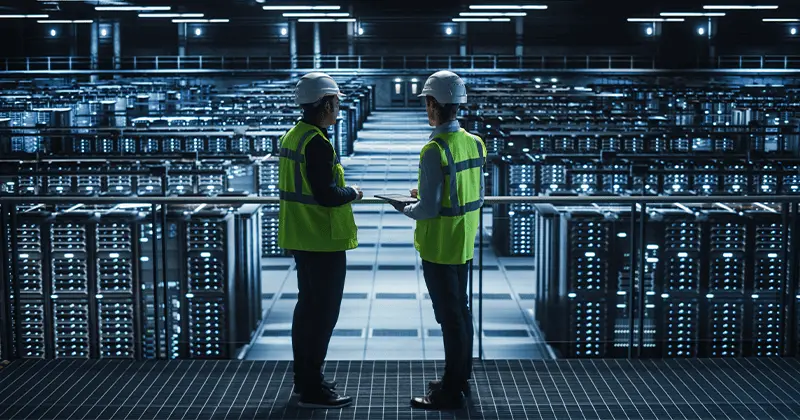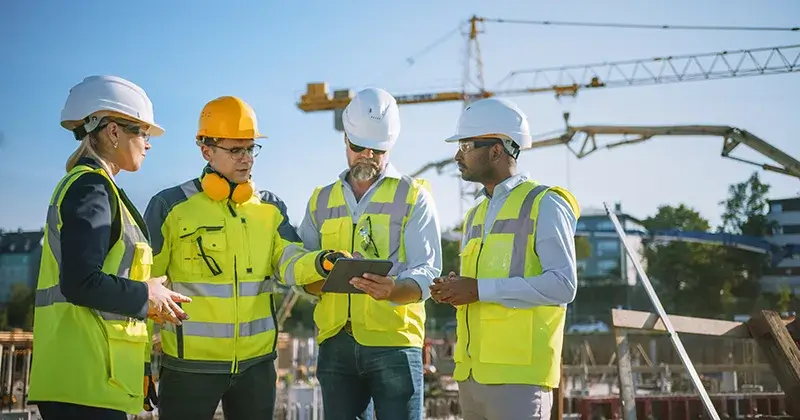22 mins read
Understanding The Importance Of Construction Project Management

- What Is Construction Project Management?
- Construction Project Management Roles
- Importance Of Project Management In The Construction Industry
- The Role Of The Project Manager In Construction
- Top 6 Construction Project Management Phases
- Tips For Efficient Project Management In Construction Projects
- Final Thoughts
Experts claim that most big construction projects are not completed on time or on budget. But this inefficient, profit-sapping trend can be vastly improved with proper management and construction software solutions.
A construction project has many moving parts, making managing it challenging. Clear guidelines will help enhance the project’s efficiency and keep everyone on the right track. Understanding the importance of this task and how to support it with the right tools is the basis for success.
In this RIB blog, we’ll tell you everything you need to know about project management in construction. Keep reading to learn the definition, importance, key roles and responsibilities, some best practices, and more!
What Is Construction Project Management?
Construction project management is the process of directing and coordinating human, material, and technology resources throughout a project’s lifecycle. It uses modern management techniques to achieve the expected scope, cost, time, quality, and productivity objectives.
Managing a project in construction is different from other industries because it involves many elements specific to the build environment, such as safety regulations and technology. These elements also change based on the project’s nature, whether residential or commercial. Regardless, the goal of project management for construction is to successfully leverage labor, materials, equipment, technology, disciplines, and regulations to deliver a project with the highest turnover.
The process starts with a project’s early development and continues through its final stages. It involves meticulous planning, coordinating, and monitoring workflows to ensure everything is completed on time and within budget.
To do so, the project manager (PM) needs the support of a multidisciplinary team to help ensure every process is completed successfully. Let’s explore some of these roles below.
Construction Project Management Roles
- Project owner: The owner commissions and finances the project. They make high-level decisions regarding budgeting, bidding, technologies, scope, and more.
- Project Manager: The PM, often referred to as the owner’s representative, is considered the leader of the project and is responsible for its overall planning, execution, and closure. Among its many responsibilities, the PM is in charge of estimating and negotiating costs, formulating a budget, managing scheduling, communicating with stakeholders, and much more.
- Construction Manager (CM): The CM reports directly to the PM and oversees daily operations on the construction site during the building process, ensuring safety and productivity in all works. They also advise the owner about the quality of materials to be procured, cost estimations, planning, and more.
- General contractor (GC): The GC provides the materials, equipment, and labor required to complete the project and generally manages the subcontractors and other onsite personnel. They differ from construction managers because their role starts after the design phase is finalized and construction begins.
- Contract Administrator: As its name suggests, the contract administrator manages all contract-related aspects. They oversee procurement, review, and negotiate deals with contractors and subcontractors, as well as track any changes or claims to the contract. They collaborate with the owner, the PM, and the CM to ensure that contracts meet legal requirements and are accurately executed.
Importance Of Project Management In The Construction Industry
Construction projects are complex processes that involve massive budgets and a lot of risk. The only way to ensure everything is carried out successfully is to manage it correctly. The risks of poor project management not only involve a waste of money for the owners but, most importantly, safety risks for labor and, in the worst case, risks for the people who will operate the building in the future due to quality issues. Therefore, understanding the importance of construction management and how to do it effectively is of utmost importance for any stakeholder involved in the process.
Below, we discuss some of the key benefits of the efficient management of construction projects.

Boosts efficiency and productivity: A well-thought-out construction project management program helps organize the work to meet deadlines and budgets. This ensures everyone knows what to work on, significantly enhancing construction productivity. Considering the number of people and processes involved in a building project, having an organized schedule of how and when each step should be completed is beneficial.
Effective communication: Communication in construction is one of the biggest challenges for companies across the industry. During project completion, good management enables owners, architects, engineers, contractors, subcontractors, and others to stay connected and work towards common goals.
Risk management: The construction environment is constantly changing and subject to unpredictable situations and risks. Proper management techniques can help predict and identify potential hazards, such as weather conditions or labor or material shortages, and implement preventive measures to mitigate them.
Cost control: Construction projects are extremely expensive, and costs can quickly escalate if not managed correctly. Efficient management with the help of construction cost control software helps control costs by performing detailed cost estimations and implementing a budget from where expenses can be tracked and optimized to ensure the project remains profitable. Learn more about cost control in construction projects here.
Quality assurance: Efficient project management ensures all quality standards are met thanks to constant control regarding materials and building code standards. Quality assurance is one of the most important aspects of a project because it directly impacts on the safety and durability of the final product; therefore, it should be taken very seriously.
The Role Of The Project Manager In Construction
We briefly discussed the different functions of construction management earlier in the post. Now, we’ll discuss the project manager’s role in more detail, as it is the most crucial player in the process.
PMs in construction are not only responsible for managing time, cost, and quality. They are also there to oversee every detail that contributes to the success of their undertaking: a completed project build. Professional construction project manager software helps the PM ensure their team meets deadlines, reaches targets, and adheres to set budgets with the right technology.
Let’s explore some common construction project management duties and responsibilities below.
Managing time: A key responsibility for any PM is time management. In the leading role, they will have an in-depth view and knowledge about the progress of the project’s different processes, allowing them to move the various pieces to ensure everything runs as expected. The intricate knowledge of the project’s critical path and the ability to report back to stakeholders on the progress of different tasks not only keeps the project within its required timeframe but also maintains a good overview and allows for protective measures to be put in place if needed.
Ensuring project success: As mentioned, the PM takes on the main role when it comes to the following steps:
- Planning
- Execution
- Monitoring
- Control
- Closure
This is another reason why this role is so important. PMs are fully responsible for whether the project achieves its mission with as few snags as possible. However, if problems do arise (this is construction, at the end of the day), the processes and procedures implemented by the PM will assist in rectifying and correcting the mistakes and getting the project back on track to achieve success.
Safeguarding solid relationships through effective communication: The PM is also responsible for ensuring a healthy relationship between the construction company and its clients by regularly reporting progress or issues. Good communication can result in good client-contractor relations that lead to beneficial treatment for any future tenders or projects. It will always do a company well to satisfy the needs and wants of their clients.
Providing a winning formula: When someone oversees many moving parts, they will gain knowledge and experience to help the company optimize future projects. Lessons learned from previous projects are the industry norm, and experience counts greatly in construction. PMs can apply their expertise and training, identify where things could go wrong, and work on how to make amendments or bring positive outcomes from these issues.
Top 6 Construction Project Management Phases
Now that you know a bit about the functions of construction management, let’s discuss the main phases of the process.

1) Initiation
Also known as conception, this is phase 0 of a project and lays the foundations for everything that will come after. At this stage, the project is defined in terms of scope and objectives, stakeholders are identified, a preliminary budget is established, and the drawings and specifications are rendered in collaboration with engineers, consultants, and architects.
During this stage, owners, in collaboration with a multidisciplinary team, conduct two studies: the feasibility study and the business case. The feasibility study evaluates how doable a project is from a technical and operational perspective. This study highlights potential challenges such as regulatory requirements, budget considerations, site limitations, etc. In the best case, the feasibility study will show the owner that the project needs some adjustments, but it is good to proceed. In the worst case, it will tell them the whole thing is a no-go.
However, a business case evaluates the project’s financial viability, assuming everything is approved from the technical and operational side. This document is used to understand whether the project is worth the investment and to justify its implementation. It outlines the costs, benefits, and expected outcomes.
2) Planning
This stage starts once the project is approved to proceed. Here, the PM selects the delivery method that best aligns with the project’s nature and develops a strategic plan to ensure everything runs efficiently. Some of the tasks involve:
- Outlining all tasks and timelines necessary to complete the project
- Doing a cost management plan and budget
- Allocating labor, material, equipment, and monetary resources to each task and phase on the schedule
- Doing a risk assessment and mitigation plan
- Defining quality standards and safety procedures
- Defining communication strategies and a single source of truth for all information and documentation
Once that is done, the PM and owner start bidding to select the team responsible for the construction. Construction bid management can vary depending on the type of contract and the project’s scope, but the end goal is the same: selecting a qualified GC.
3) Preconstruction
The preconstruction stage starts once the GC is selected. As its name suggests, at this phase, the team ensures that all requirements and preparations are in place before construction can start. It is a fundamental stage in the process as it helps ensure no details are missed that could affect the project later.
During preconstruction, the GC will:
- Conduct a cost assessment that includes construction costs, materials, labor, and services to develop an accurate procurement strategy.
- Secure any permits or regulatory approvals.
- Do a site inspection to confirm that everything stated in the contract is accurate. It is also the first opportunity the GC gets to identify potential issues for construction.
- Create a risk management plan and mitigation strategies.
- Set up a safety plan. The owner’s team completes this step, but contractors also take care of it independently since it is important and, in most cases, life and death.
- Generate a work breakdown structure (WBS) listing all tasks and activities to have a clear outline from start to finish. The PM then takes the WBS and turns it into a schedule with defined milestones to assess progress.
- Set up a communication plan that matches the overall project communication plan. Here, the GC specifies the frequency of communication and the responsibilities of the owner to provide information.
4) Procurement
Once all planning, design, and budgeting are ready, contractors put together a procurement strategy that involves bidding and selecting subcontractors and suppliers to ensure the quality standards and goals of the project are met. Sometimes, when the project requires special materials or equipment, the owner begins procurement even before the GC is hired. However, in most cases, the GC is responsible for procuring materials and equipment.
The GC uses construction specifications, including a bill of quantities, to ensure the right quantities and quality of materials, equipment, and labor are procured and shipped on-site according to the expected schedule.
5) Construction
Also known as execution, this is the stage where construction finally begins. Management takes an active role in ensuring all activities and tasks are successfully coordinated and completed according to timeline, budget, and quality standards. The PM maintains close communication with all stakeholders to assess progress, identify potential issues, and tackle them to ensure the project remains on schedule. During this stage, progress is recorded in interactive reports that every stakeholder can access in real-time, making the workflow more efficient and collaborative.
As the construction process advances, unexpected design changes or scope modifications are normal. The contractor and PM evaluate the impact of these changes on the budget and project timeline and collaborate with the owner to formulate strategic plans for moving forward. These changes usually involve reallocating resources and changing the original plan while ensuring the final product remains the same.
The correct management of construction projects from the initial stage shines through during execution. All the planning and scheduling done in the previous stages set the groundwork for what will happen in the building phase. The project’s result will exceed expectations with the correct coordination and tools.
6) Post Construction
Also called project closeout, it is the final phase of the management process. It entails finalizing all construction activities and tasks to close the project formally. During this phase, a punch list is generated, listing all small tasks that still need to be completed. A final site inspection is also done to ensure all the completed work meets the drawings, specifications, and quality. Any inefficiencies found in the punch list during the final inspection are addressed and resolved, and final permits are approved by authorities to occupy the building safely.
After the owner approves everything, the contractor can begin closing contracts with suppliers and subcontractors and gathering all the closing documents for the client. After the project is closed, the GC will still be responsible for addressing any operational issues that arise from construction.
The PM will formally review the entire project and gather feedback from the different stakeholders to identify any construction project management mistakes and learn from them for future projects.
Tips For Efficient Project Management In Construction Projects
One of the typical project management challenges in construction is arranging everything simultaneously and efficiently. We are talking about setting up a defined schedule, allocating resources, setting quality standards, managing risk and procurement, organizing teams, and much more.
To do so effectively, it is important to draw up a clear project management plan for construction before starting the project. The plan needs to address all the client’s expectations, lay out the different processes, and outline how the tasks will roll out. The right construction planning software can help you centralize all processes and generate a realistic schedule to approach each phase.
2) Produce regular reports
Another tip for efficient project management is to implement a construction reporting process to document all developments and progress of the project. The data contained in the reports helps the PM and other team members to inform their most critical strategic decisions with accurate information. We mentioned how important experience is in this industry; however, intuition and knowledge can only get you so far. Data-backed reports provide a single source of truth coming directly from the project operations, making them the perfect tools to identify improvement opportunities and track progress.
Depending on the purpose, project management reports can be delivered daily, weekly, bi-weekly, or monthly. Some information should always be included, no matter the type of construction underway. These critical points include:
- The name of the project, the manager, and the client
- The start and expected end dates
- Contact information for key stakeholders
- The report’s release date
- The current schedule progress as measured against the project’s agreed baseline construction program
- A current cost vs budget comparison or Cost Value Reconciliation (CVR) report
- The current scope compared to the agreed scope
- An updated risk overview
- Updates on any pending or approved change requests (variation orders)
- A summary of key high-level decisions and actions implemented since the release of the previous report
- Upcoming project milestones
- Updated net cost and income forecasts
Some stakeholders may be reluctant to add the reporting element to a construction project. Still, reporting ensures more streamlined processes across the board, which improves the overall execution of the construction plan. By sharing real-time information effectively, project stakeholders can monitor progress and compliance with the plan, allowing parties to address issues quickly, which can help avoid costly delays and changes. Construction management software, such as RIB Candy, houses all the relevant information on one platform and links all processes from planning to the final account, allowing for centralized decision-making.
3) Communicate effectively
We might sound like broken records here, but communication is crucial in many aspects of the successful management of construction projects and is often overlooked. When managing so many relationships and processes simultaneously, efficient communication is the only way to ensure everyone is on the same page and working with updated information. Effective communication helps reduce confusion and ensures workflows move on as planned.
Not only that but communicating effectively also helps manage expectations from the different parties, a challenge that PMs need to overcome at the beginning of the process.
4) Use modern construction software
In the past, construction project management mistakes were an everyday occurrence. That was not necessarily because the PM needed to do a better job but because the work was siloed due to huge communication challenges. Luckily, modern construction software provides PMs and construction teams with the necessary tools to oversee every aspect of the project in a centralized location. Solutions such as RIB 4.0 offer a centralized platform that supports detailed planning, monitoring, and control to ensure resources are allocated efficiently and tasks are completed within time and expected budget.
The best part is that these solutions are cloud-based, which means all project data can be accessed online from anywhere. This makes on-site management much easier and breaks the communication barrier that has burdened the industry for so long.
5) Go green!
RIB’s latest construction sustainability report shows that 74% of surveyed companies have not estimated their projects’ embodied carbon emissions. Considering that the construction industry is one of the biggest polluters in the world, going green is an excellent management practice that will make projects more sustainable and conscious.
When we say, “Go green,” we are not only talking about tracking and managing carbon emissions. Although this is an amazing practice that all construction companies should implement, other ways exist to make projects a bit “greener.” One way is to think of ways to optimize energy and water consumption during project completion and post-construction operations.
Final Thoughts
Managing a construction project efficiently involves widespread duties. Construction management happens from the planning phase to the last brick being laid down. PMs play an important role in the success of projects by keeping everything running smoothly and on track throughout every stage.
For the best results, why not use a built-for-purpose solution that can make project management easier and more efficient? Look at the all-in-one project management software RIB Candy, which will help your project managers boost each project’s success. Book a demo today!

Most Recent
22 mins read
15 mins read
49 mins read
24 mins read

E-BOOK











